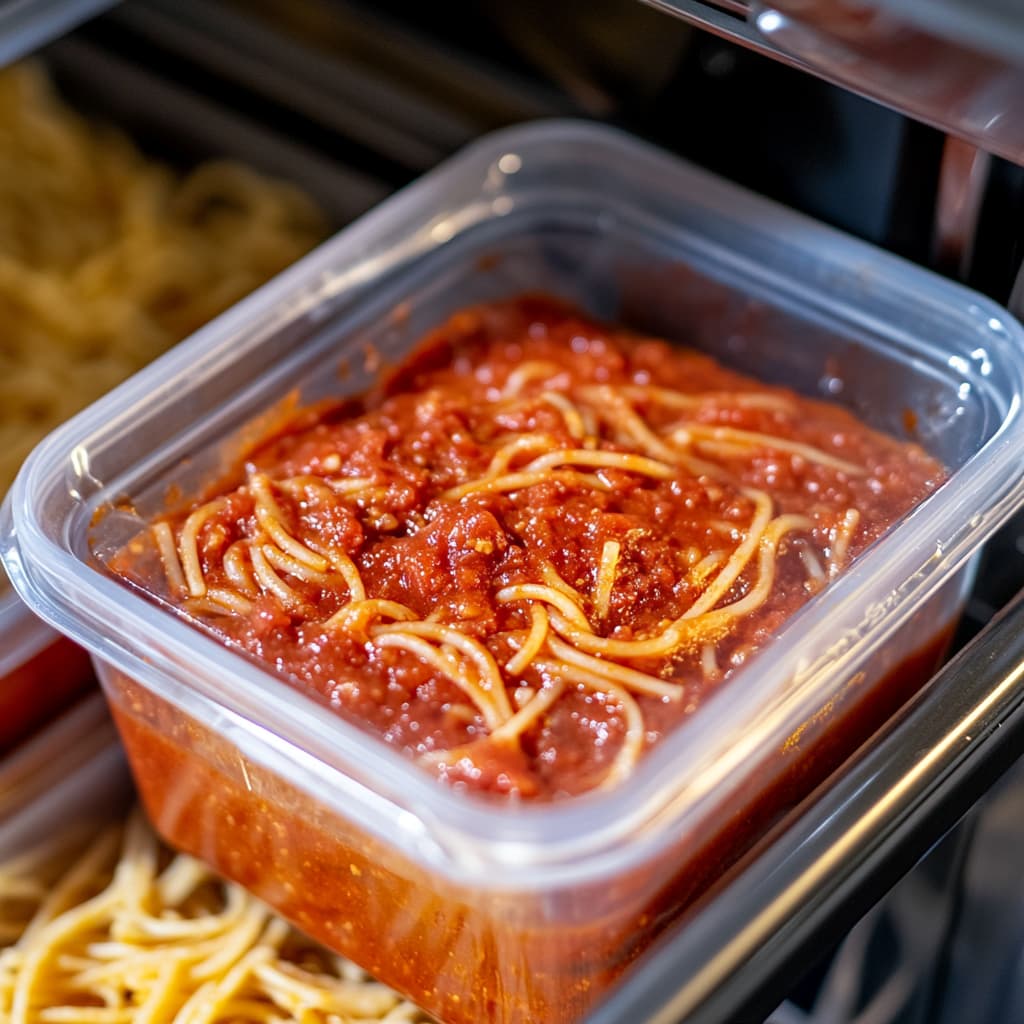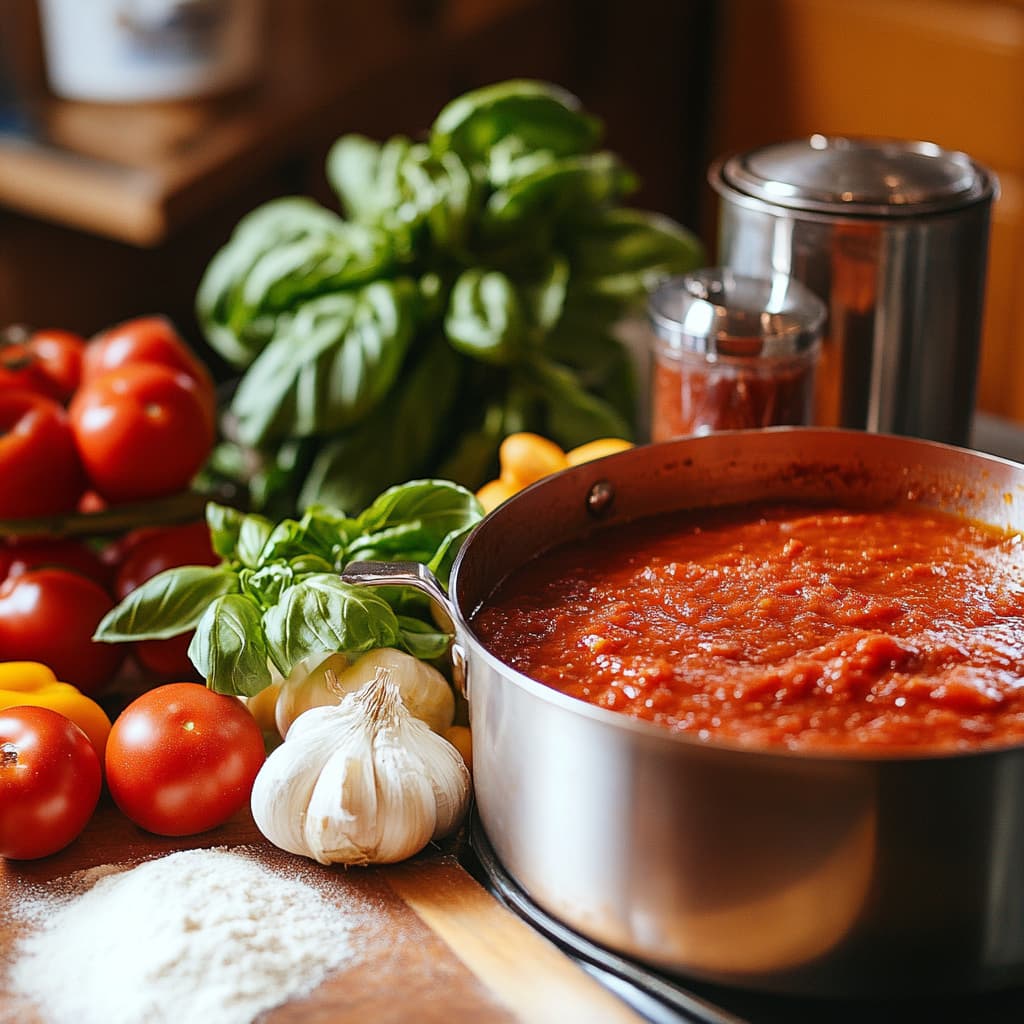Introduction
When it comes to preparing a delicious spaghetti dish, the sauce often steals the show. The consistency of spaghetti sauce plays a crucial role in how well it coats the pasta, balances the flavors, and creates an overall delightful dining experience. A common question for home cooks is, “Will spaghetti sauce thicken as it cooks?” The answer lies in understanding the science behind cooking and the factors that influence a sauce’s texture. In this article, we’ll explore why spaghetti sauce thickens, how to enhance its consistency, and tips for achieving the perfect texture every time.
Many cooks wonder, Will spaghetti sauce thicken as it cooks? This guide will explain the science, techniques, and tips for achieving the perfect consistency.
The Science of Sauce Thickening

Understanding the Evaporation Process
One of the primary reasons spaghetti sauce thickens as it cooks is due to evaporation. As the sauce simmers, water content gradually reduces, leaving behind the concentrated flavors and thicker texture. This natural process occurs because heat encourages water molecules to escape as steam, thus lowering the overall liquid content.
How Heat Affects Sauce Texture
Heat doesn’t just evaporate water; it also affects the structure of the ingredients. For instance, tomatoes, a key ingredient in most spaghetti sauces, release natural pectin when heated. Pectin is a carbohydrate that acts as a natural thickener, enhancing the sauce’s texture. Simultaneously, ingredients like onions and garlic break down and meld with the sauce, contributing to a thicker consistency.
Factors Influencing Sauce Thickness
Ingredients in the Sauce
The type of ingredients used in your spaghetti sauce significantly impacts its thickness. Tomato paste, crushed tomatoes, or canned whole tomatoes with minimal added liquid are more likely to produce a thick sauce. Conversely, sauces with a high water content, such as those made from fresh tomatoes or broth, may take longer to thicken.
Cooking Time
The length of time you cook your spaghetti sauce also determines its thickness. Longer cooking times allow more water to evaporate, resulting in a thicker consistency. Slow-simmered sauces often have a rich, velvety texture that clings beautifully to pasta.
Heat Intensity
Cooking temperature is another crucial factor. A sauce simmered on low heat thickens gradually, allowing flavors to develop harmoniously. High heat may thicken the sauce faster but can lead to uneven texture or even burning if not monitored closely.
Techniques to Thicken Spaghetti Sauce
Natural Evaporation
Letting your spaghetti sauce simmer uncovered is one of the easiest ways to thicken it. Removing the lid ensures that steam escapes freely, speeding up the evaporation process. Stirring occasionally prevents the sauce from sticking to the pot and promotes even cooking.
Using Thickening Agents
If you’re short on time, you can use thickening agents to achieve the desired consistency quickly. Popular options include:
- Cornstarch Slurry: Mix 1 tablespoon of cornstarch with 2 tablespoons of water and stir it into the sauce. Heat until thickened.
- Flour Paste: Combine equal parts flour and butter to form a roux and incorporate it into the sauce.
- Arrowroot Powder: A gluten-free alternative to cornstarch, arrowroot thickens sauces without altering the taste.
Adding Starchy Ingredients
Starchy additions like pasta water, mashed potatoes, or pureed beans can enhance the thickness of your sauce naturally. Pasta water, in particular, contains residual starch that binds the sauce and helps it cling to the pasta.
Common Mistakes to Avoid
While thickening spaghetti sauce is relatively straightforward, certain missteps can affect the outcome. Avoid these common mistakes to ensure your sauce achieves the perfect consistency without compromising flavor or texture.
Overcooking the Sauce
While longer cooking times can help thicken a sauce, overdoing it can lead to burnt or overly reduced sauce. Overcooking not only alters the flavor—making it overly concentrated or bitter—but can also ruin the smooth texture by sticking to the pan.
Adding Too Much Thickening Agent
Thickening agents like cornstarch or flour are excellent for quick fixes, but overuse can result in a pasty or gummy texture. Always add these agents gradually and in small amounts, stirring continuously to monitor the thickness.
Forgetting to Stir
Stirring is critical when thickening a sauce, especially during the evaporation process or when using starch-based thickeners. Without stirring, the sauce may stick to the pot and form clumps, creating an uneven texture.
Using Too High Heat
High heat may seem like a quick solution to thicken sauce, but it can backfire. Rapid boiling can cause uneven evaporation, leading to a sauce that’s thin in some areas and overly thick in others. Stick to a gentle simmer for best results.
Adjusting Sauce Flavor While Thickening
As the sauce thickens, its flavors become more concentrated. While this is often desirable, it’s essential to taste and adjust the seasoning to ensure a balanced outcome. Here are some tips:
- Reassess Salt Levels: Thickening reduces the liquid volume, which can intensify saltiness. Add salt cautiously during the initial stages and adjust towards the end.
- Brighten with Acidity: If the flavors become too heavy or dull, a splash of red wine vinegar or fresh lemon juice can restore balance.
- Enhance with Fresh Herbs: Adding fresh basil, parsley, or oregano near the end of cooking can refresh the sauce and complement its thickened texture.
Thickening Without Changing Flavor
If you’re looking for a way to use your thickened spaghetti sauce without altering its flavor, consider incorporating it into a casserole. This Spaghetti Casserole recipe is a perfect way to enjoy your sauce with minimal additional ingredients.

Simmering Uncovered
This method allows the sauce to thicken naturally without adding any external ingredients. Simply remove the lid and let the steam escape while the sauce cooks. This method retains the sauce’s authentic flavor while achieving the desired consistency.
Using Pureed Vegetables
Blending cooked vegetables like carrots, onions, or zucchini and incorporating them into the sauce is another natural way to thicken it without affecting the taste. These vegetables break down seamlessly and add a subtle richness.
Gelatin-Free Methods
If you’re avoiding gelatin or other animal-based thickeners, starches like tapioca or pureed legumes can work wonders. These alternatives are flavor-neutral and ideal for maintaining the sauce’s original profile.
Thickening for Special Diets
Modern dietary preferences often require adaptations to traditional recipes. Here’s how to thicken spaghetti sauce while catering to different dietary needs:
Gluten-Free Options
For those avoiding gluten, cornstarch, arrowroot powder, or tapioca starch are excellent substitutes for flour. These alternatives create a smooth, glossy texture without compromising dietary restrictions.
Vegan Methods
Vegan cooks can rely on plant-based thickeners like pureed beans, lentils, or mashed avocados. These ingredients not only thicken the sauce but also add nutritional value.
Keto-Friendly Choices
Low-carb eaters can thicken their spaghetti sauce using cream cheese, heavy cream, or almond flour. These options ensure a thick, creamy sauce without exceeding carbohydrate limits.
Tools and Utensils to Use
The right tools can make a significant difference in the outcome of your spaghetti sauce. Here are some kitchen essentials:
- Heavy-Bottomed Saucepan: Prevents scorching and allows even heat distribution for gradual thickening.
- Wooden Spoon or Silicone Spatula: Ideal for stirring, as they prevent scratching non-stick pans.
- Immersion Blender: Perfect for pureeing ingredients directly in the pot, saving time and reducing mess.
- Mesh Strainer: Helps achieve a silky-smooth texture by removing lumps or unwanted chunks.
FAQ Section
1. Can you thicken sauce quickly?
Yes, you can thicken spaghetti sauce quickly by using a thickening agent. Mixing a tablespoon of cornstarch or flour with water to create a slurry, then stirring it into the simmering sauce, can deliver fast results. However, be cautious not to overdo it, as too much thickening agent may affect the sauce’s texture or flavor.
2. How do you fix over-thickened sauce?
If your sauce becomes too thick, it’s simple to fix. Gradually add small amounts of liquid, such as water, vegetable broth, or unsalted pasta water, until the desired consistency is reached. Ensure that the liquid is added while stirring to maintain an even texture.
3. What is the best way to thicken without starch?
Thickening without starch can be achieved by simmering the sauce uncovered to let water evaporate naturally. Pureeing some of the sauce ingredients, like cooked tomatoes or vegetables, and stirring them back in can also add thickness while preserving the sauce’s flavor.
4. How does simmering compare to boiling for thickening?
Simmering is more effective and controlled for thickening sauces than boiling. Boiling may cause the sauce to reduce too quickly, risking over-thickening or burning. Simmering, on the other hand, allows for gradual evaporation, enabling the flavors to develop and concentrate evenly.
5. Why does my sauce not thicken no matter what I try?
Several factors could prevent your sauce from thickening:
- Excess liquid from added water or broth.
- Cooking on too low heat, which slows evaporation.
- Ingredients with high moisture content, such as fresh tomatoes. To resolve this, ensure you’re simmering the sauce uncovered and consider using a thickening agent or blending a portion of the sauce.
6. Is it better to thicken before or after cooking pasta?
It’s generally better to thicken spaghetti sauce before combining it with pasta. A thicker sauce adheres better to the pasta, creating a well-coated dish. However, if the sauce seems too thin after mixing with the pasta, you can simmer it briefly to achieve the desired consistency.
7. Will spaghetti sauce thicken as it cooks?
Yes, as water evaporates during cooking, the sauce naturally thickens while its flavors concentrate.
Conclusion
Achieving the perfect spaghetti sauce consistency requires a balance of technique, timing, and the right ingredients. Yes, spaghetti sauce will naturally thicken as it cooks due to evaporation and the breakdown of ingredients. By understanding the process and employing methods like simmering, using thickening agents, or incorporating starchy additions, you can tailor your sauce to your preferences. Avoid common mistakes, adjust the flavor as it thickens, and choose tools that make the process easier. Whether you’re cooking for a casual dinner or a special occasion, these tips will ensure your spaghetti sauce is always thick, flavorful, and satisfying.
By understanding the techniques outlined in this guide, you can confidently answer the question, Will spaghetti sauce thicken as it cooks? and achieve perfect results every time.

